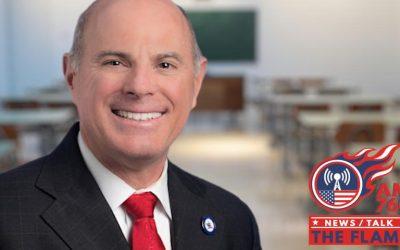Tennessee State Representative Gino Bulso (R-Brentwood) said he expects his bill prohibiting the displaying of certain flags on or in a public school, including LGBTQ pride flags, to soon pass the Senate and be signed into law by Governor Bill Lee.
Dr. Carol M. Swain: ‘You Can be Dumb as Rocks and Go to Harvard’
Dr. Carol M. Swain joined Thursday’s edition of The Tennessee Star Report with Michael Patrick Leahy to discuss the latest developments surrounding her battle with Harvard University regarding its former president’s alleged plagiarism of her and other scholars’ work as well as the overall decline of the university as it attempts to implement a new “standard.”
In December 2023, writer and activist Christopher Rufo accused then-Harvard University President Claudine Gay of plagiarizing “multiple sections” of Swain’s Ph.D. thesis from 1997.
Mayoral Candidate Jim Gingrich Opposes Titans Stadium Deal as Structured
Monday morning on The Tennessee Star Report, host Leahy welcomed Nashville mayoral candidate Jim Gingrich in studio to discuss his disfavor with the current Titans Stadium deal, Nashville’s growth, and the effect on taxpayers.
Executive Director Timothy Head: Faith and Freedom Coalition Focuses on Life, Marriage, Traditional Family, and Religious Liberty
Tuesday morning on The Tennessee Star Report, host Leahy welcomed the National Executive Director of the Faith and Freedom Coalition, Timothy Head to the newsmaker line to discuss their four key issues going forward in 2023.
Nashville Mayoral Candidate Natisha Brooks Outlines Her Agenda Items
Friday morning on The Tennessee Star Report, host Leahy welcomed Nashville mayoral candidate Natisha Brooks in studio to discuss her stance on the Titans Stadium deal, reduction of Metro Council members, police support, education, and fixing the budget.
All-Star Panelist JC Bowman Comments on Tennessee Principals’ Trip to Louisville, Penny Schwinn, and School Security
Friday morning on The Tennessee Star Report, host Leahy welcomed all-star panelist and the CEO of Professional Educators of Tennessee, JC Bowman in studio to discuss the half-million dollar Tennessee principal trip to Louisville, Kentucky, Education Commissioner Penny Schwinn, and school safety.
Carol Swain on Teacher Union Greed, DEI, and the Suffering of America’s Students
Live from Music Row, Wednesday morning on The Tennessee Star Report with Michael Patrick Leahy – broadcast on Nashville’s Talk Radio 98.3 and 1510 WLAC weekdays from 5:00 a.m. to 8:00 a.m. – host Leahy welcomed all-star panelist Carol Swain in studio to discuss her...
Tennessee House of Representatives Candidate for District 35 William Slater Talks About His Passion for Education, Background, and Why He’s Running
Tuesday morning on The Tennessee Star Report, host Leahy welcomed District 35 candidate for the Tennessee House of Representatives, William Slater in studio to talk about his education, background, and why he’s running for public office.
Former NYU Professor and Thought Criminal Author Michael Rectenwald: The American University System Is Rotten to the Core
Friday morning on The Tennessee Star Report, host Leahy welcomed former NYU Professor and author of Thought Criminal and other titles, Michael Rectenwald in studio to discuss to promote his book signing and what makes him a thought criminal.
Madison County Mayoral Candidate AJ Massey: Focusing on Schools and Education Will Help Kill ‘Public School-to-Prison Pipeline’
Wednesday morning on The Tennessee Star Report, host Leahy welcomed Republican Mayoral Candidate for Madison County, AJ Massey to the newsmakers line to discuss his background and answer questions on education.
PragerU’s Jill Simonian Announces New Platform for Kids at Prageru.com/Kids
Friday morning on the Tennessee Star Report, host Michael Patrick Leahy welcomed Prager U’s Jill Simonian to the newsmakers line to talk about their new platform PragerU Kids, bestselling children’s books, and educational videos.
Executive Director of Seeking Educational Excellence Charles Love Recounts His Experience of Growing Up Black in America
Thursday morning on the Tennessee Star Report, host Michael Patrick Leahy welcomed the Executive Director of Seeking Educational Excellence Charles Love to the newsmakers line to discuss his recent essay and growing up Black in America.
GOP Candidate Robby Starbuck Talks About Growing Up in America Without a Victim Mentality
Tuesday morning on the Tennessee Star Report, host Michael Patrick Leahy welcomed GOP Republican Candidate for the Fifth Congressional seat Robby Starbuck in studio to discuss education and growing up Cuban.
Tennessee State Senator Ferrell Haile Discusses One of His Top Three Priorities Citing Progress in Safe Baby Courts
Wednesday morning on the Tennessee Star Report, host Michael Patrick Leahy welcomed Tennessee State Senator Ferrell Haile to the newsmakers line to talk about his three top priorities as Senator which are children, families, and education in addition to the progress he’s made in the safe baby court.
Federalist Executive Editor Joy Pullmann on Southlake Texas Battle with Critical Race Theory
Tuesday morning on the Tennessee Star Report, host Michael Patrick Leahy welcomed Executive Editor at The Federalist and Author Joy Pullmann to the newsmakers line to discuss her recent article addressing the demonization of Southlake, Texas parents speaking up against racist cultural competence plans in their community.
Ben Cunningham Weighs in on the Moral Narcissism and Self-Appointed Martyrs of the Left in Vogue Britian’s Recent Piece
Wednesday morning on the Tennessee Star Report, host Michael Patrick Leahy welcomed guest co-host Ben Cunningham in studio to weigh in on a recent narcissistic article in Vogue Britain which questioned whether or not having a child was a danger to the environment.
Rep. Sexton Talks Cutting Strings Attached to Federal Money and Maintaining Tennessee Values in Public Schools
Monday morning on the Tennessee Star Report, host Michael Patrick Leahy welcomed State Rep. Jerry Sexton in studio to discuss critical race theory in Tennessee’s public schools and cutting the strings that are attached to federal education money coming from Washington into the state.
Author Professor Dr. Peter Gray of Free to Learn Discusses the Data Showing Children Today as More Depressed and Anxious and Less Creative
Thursday morning on the Tennessee Star Report, host Michael Patrick Leahy welcomed Professor and author of Free to Learn Dr. Peter Gray to the newsmakers line to discuss how lack of childhood playtime is showing signs of increased depression and less creativity in kids.
Tennessee State Rep. Scott Cepicky Weighs in on MLB Gone Woke and the Coming Agenda in the General Assembly
Tuesday morning on the Tennessee Star Report, host Michael Patrick Leahy welcomed Tennessee State Rep. Scott Cepicky to the newsmakers line to discuss MLB gone woke, cancel culture, election laws, and the upcoming agenda in the Tennessee General Assembly.
Tennessee State Rep. Scott Cepicky Talks Education and His New Bill Called the Teacher’s Discipline Act
Thursday morning on the Tennessee Star Report, host Michael Patrick Leahy welcomed State Rep. Scott Cepicky to the studio to talk about one of 10 bills he’s introducing called the Teacher’s Discipline Act.



















